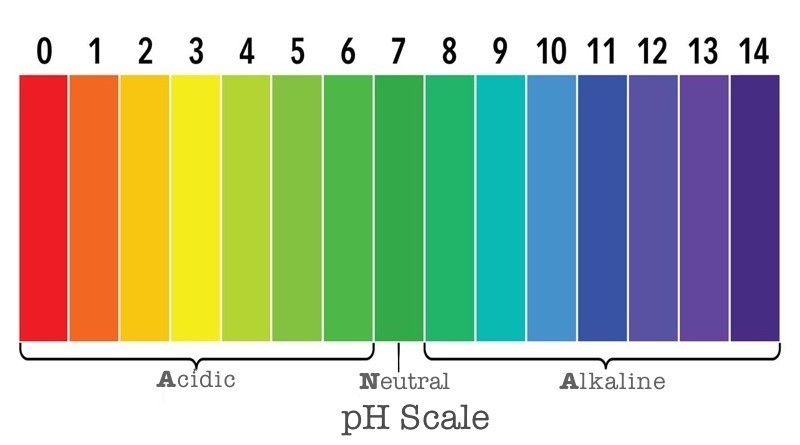Does your horse have a disturbed PH value?
Have you ever thought of the importance of the pH value? and how a disturbed value can lead to health issues?
We would like to discuss 2 types of pH values that are very important to look at.
- pH value in the equine blood
- pH values in the equine gut
What is the PH value?
Ph is the degree of acidity. You have a PH value between 0 and 14. So 0 is very acidic and 7 is considered to be neutral.
In our daily feed and in your equines feed you have a lot of acids and alkaline. An example of a few acid feeds for equines are grains, starch, sugar but also wrapped up hay/haylage.
Other causes of a low pH value and acidic environment besides feeding the wrong feed, are stress and hard training.
Besides acidic feed we also have alkaline feeds. Which is something a horse naturally only eats. Such as grass, stems, leaves, branches, other plants and minerals.
So what happens if your horse is getting a lot of acids into its body?
Lets take a look at the pH in the blood first. It is important to know that the PH value in the equine blood should be between 7.34 and 7.48.
If this is not the case and the blood is too acidic then the body will correct this by using its `stores`. Minerals such as magnesium, calcium and phosphorus will be used. But if your horse has `empty stores` then it will start extracting these minerals from bone structures and glutamine from muscles.
Your horse can end up with weaker bones, joints, ligaments, tendons and organs.
You can get the vet to test the pH value in your horses blood. But the body will do everything it can to keep the pH value high. So you most likely you wont see anything in the blood works. If you do, then you are too late and the issue is very far gone.
But there are early markers that indicate acidity in the horses blood. For example:
- cramped muscles after working out
- not recovering fast enough after training
- sour smell of manure and urine
- slow recovery of wounds
- problems with tendons, joints, muscles
What about the Ph value in the gut?
The pH value in the gut should be between 6.8 and 7.2.
When this pH value drops then the hindgut becomes more acidic and the fibre fermenting bacteria are less efficient and die. Which then releases endotoxins into the body. The lactic acid bacteria in the gut like an acidic environment and these bacteria will then start to grow. The increased acidity damages the mucosa of the gastric wall.
Endotoxins can cause inflammation which can result in laminitis among other many diseases.
Also, your burdening the liver and kidneys a lot with all of these endotoxins. The liver will need to work a lot harder to get rid of the toxins. When the liver struggles it will start to use certain minerals to help get rid of the toxins, such as sulphur and zinc ( but also selenium and manganese ). sulphur is needed to build up the normal protected mucous layer. Without this layer horses can also for example get airway issues because the airways fall dry and this leads to inflammation of the airways. A lack of sulphur can also be seen in slow growth of hooves, hair, skin and hoof issues.
Zinc is needed everywhere ( immune system) and zinc also neutralises acid.
Also, when the hindgut is acidic and the microbiome in the hindgut is disturbed then Vitamin B12 and B6 can be deficient. These are produced by bacteria in the hindgut. B12 produces haemoglobin ( makes the red colour of blood ) >transport oxygen from lungs to blood. Horses that are tired quick and breath heavy during workout can have a B12 deficiency
And B6 is needed for a detox in the liver.
Signs and early markers for a low pH value in the gut are:
- colic symptoms
- hindgut ulcers
- reduced performance
- slow recovery
- swollen lymph or swollen legs
- tendon issues
And many more.
If your horse has a cough, sweet itch, laminitis, or a hoof abscess then in most cases your horse has been having an acidic environment in his gut for quite a while. And maybe your horse is a KPU candidate. You can read more about this in a different blog.
Treatment and prevention:
It is very important to look at the whole management around the horse. This include stress, workout/training and diet.
1. Most importantly is to feed hay. Preferable hay with a sugar content of less than 10% and for horses with metabolic issues we advise a sugar content below 6%. ( We will be writing another blog and make a DIY video in regards to testing your own hay for sugar content )
2. Before you buy a bag of feed we advise you to look at the sugar and starch content in concentrated feeds. Most of them contain a lot, including hidden sugars such as carrot, apple pomace and many more.
3. Also look at the way you train the horse and ask yourself if this is done correctly. Incorrect training can make the horse acidify which can lead to breaking down the muscles instead of building up muscles.
4. And of course if your horse is stressed then you should try and find out why and eliminate this.
I have made a DIY video on how to test the PH value of the gut yourself. Check it out here: https://youtu.be/aSmgErcxeBA
How to test the pH value
Simply use pH sticks from the pharmacy (those you use for testing urine samples for pH).
1) Take a small amount of fresh faeces from your horse
2) Add the same amount of distilled water (sold in the supermarket for hot irons or refilling car batteries, just test the water once before you start using it, the pH should be 7)
3) shake it, so the poo is liquified
4) Put the test strip into the liquid and check the pH according to the colour table on the test strip package.
It should be around 6.8 - 7.2 in a healthy horse. If you have a horse with a lower pH, you have hindgut acidification

What should I do when the pH tests shows acidification in my horses hindgut?
Like mentioned before there are several ways to prevent and treat horses with an acidic hindgut.
At The Horse Therapist we can give you some custom made advice and look at your whole horse to find out what treatment suits best. There are several products that can help and support the horse. We can find out what the horse needs and help to get it healthy again.
Written by Sharon Bronsveld from The HorseTherapist
References:https://askheltie.com/natascha-bos-verstoorde-ph-waarde-bij-paarden-vaak-niet-herkend/
